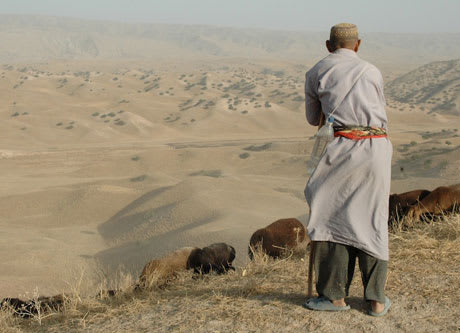Starting back in the days of good ole Genghis Khan and played primarily in Afghanistan (and other various "Stans," like Tajikistan, where this documentary takes place), Buzkashi is like an ersatz football/polo hybrid, only the operative ball is the decapitated carcass of a dead goat. Watching it is much like watching a poorly choreographed cowboy horse clusterfuck, with hundreds of men on horses trying to carry said carcass around two goal lines and dump it in a dirt pit. It's pretty nasty.
Mirza's documentary isn't quite as interested in the specifics of the game so much as he is in the standard theme for cinema made in that part of the world, which is the death of tradition and the mourning of change, or globalization. One of the main subjects is Buzkashi champion Azam, whose idea of honour is to kick-ass at hauling goat carcass. His plights are these: his son is more interested in academia than in herding animals and grinding against other men to obtain rotting meat, and corporate sponsorship (seriously) is infiltrating the game, making the wealthy Khurshed more of a shoe-in for winning. As he would say, "they're like the mafia."
This gives the film an overall sombre and reflective tone, as Azam pouts about his game being spoiled by other kids not playing fair and his son setting out on a different path. It's beautifully shot and intelligently edited to ensure thematic continuity and emotional depth, but it's really just more of the same male moping that defines the filmmaking of that region.
On a lighter note, many of the documentary subjects, in between bouts of babbling about how awesome and manly their game is, talk about getting Buzkashi into the Olympics. I have to say that I am completely on board with this since I would love to hear someone try to commentate it on CTV: "Oh, it looks like Azam has stolen the goat carcass from Khurshed. And, oh, what is that, Samantha?" "Those are goat entrails, Jim."
(Kinosmith)Mirza's documentary isn't quite as interested in the specifics of the game so much as he is in the standard theme for cinema made in that part of the world, which is the death of tradition and the mourning of change, or globalization. One of the main subjects is Buzkashi champion Azam, whose idea of honour is to kick-ass at hauling goat carcass. His plights are these: his son is more interested in academia than in herding animals and grinding against other men to obtain rotting meat, and corporate sponsorship (seriously) is infiltrating the game, making the wealthy Khurshed more of a shoe-in for winning. As he would say, "they're like the mafia."
This gives the film an overall sombre and reflective tone, as Azam pouts about his game being spoiled by other kids not playing fair and his son setting out on a different path. It's beautifully shot and intelligently edited to ensure thematic continuity and emotional depth, but it's really just more of the same male moping that defines the filmmaking of that region.
On a lighter note, many of the documentary subjects, in between bouts of babbling about how awesome and manly their game is, talk about getting Buzkashi into the Olympics. I have to say that I am completely on board with this since I would love to hear someone try to commentate it on CTV: "Oh, it looks like Azam has stolen the goat carcass from Khurshed. And, oh, what is that, Samantha?" "Those are goat entrails, Jim."
